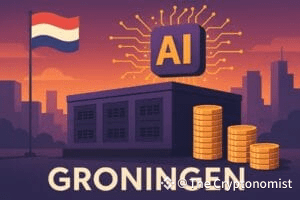
The government of the Netherlands has announced an investment of 70 million euros for the creation of an advanced artificial intelligence (AI) facility in the northern city of Groningen.
This initiative, made public on June 27, represents a decisive step in the national and continental strategy to strengthen research and technological development in key sectors such as agriculture, healthcare, energy, and defense.
A national consortium to lead AI innovation in the Netherlands
The new plant will be managed by a consortium of Dutch organizations, which will have the task of transforming Groningen into a true research hub for artificial intelligence.
The stated goal is to develop innovative technologies capable of responding to the emerging needs of various productive and social sectors, while simultaneously strengthening the country’s technological autonomy.
According to what was reported by the government, the project aims to create a strong national infrastructure for artificial intelligence, reducing dependence on solutions and platforms developed abroad.
In particular, the initiative aims to position the Netherlands as one of the main European players in the field of AI, promoting collaboration between public institutions, universities, and private enterprises.
The financial commitment of the Dutch government could be further strengthened thanks to the co-financing of the European Union, for an additional value of 70 million euros.
The request has already been officially submitted and, if accepted, would bring the overall budget of the project to considerable figures.
To this is added the contribution expected from the regional administration of Groningen, which has announced its intention to invest 60 million euros in the plant.
The synergy between national, regional, and European funds represents a key element for the success of the initiative, ensuring adequate resources for the creation of cutting-edge infrastructure and for the attraction of talents and skills.
The announcement of the investment comes at a crucial moment for Europe, which is trying to build its own artificial intelligence infrastructure to reduce dependence on large foreign tech companies, particularly American ones.
The growing geopolitical tensions and the trend of the United States towards more isolationist policies have indeed raised concerns about the security and economic competitiveness of the continent.
The Minister of Economy, Vincent Karremans, emphasized the strategic importance of developing proprietary technologies:
“Those who do not develop technology on their own depend on others. That is why we are fully committed to a strong Dutch artificial intelligence infrastructure,” he stated on the official government website.
Cross-applications: from agriculture to defense
The Groningen facility will be dedicated to research and development of artificial intelligence applications in a wide range of sectors. Among the areas of greatest interest are:
– Agriculture: solutions to optimize production, improve sustainability, and reduce environmental impact.
– Healthcare: tools for early diagnosis, clinical data management, and support for medical decisions.
– Energy: technologies for energy efficiency, grid management, and the integration of renewable sources.
– Defense: advanced systems for national security and the protection of critical infrastructures.
This transversality confirms the central role that artificial intelligence is destined to play in the economic and social development of the coming years, making targeted investments and attentive governance indispensable.
With this initiative, the Netherlands aims to become one of the leading countries in Europe in the research and development of artificial intelligence.
The choice of Groningen as the site for the facility is not random: the city boasts a solid academic and scientific tradition, as well as a strategic position for collaboration with other centers of excellence in Europe.
The project is part of a broader European strategy aimed at promoting technological independence and ensuring that innovations in the field of AI are developed according to principles of safety, ethics, and transparency.
A strong signal for the digital future of Europe
The investment by the Dutch government represents a strong and concrete signal of the willingness to lead the digital transition and to tackle the challenges posed by the rapid evolution of smart technologies.
In an increasingly competitive global context, the ability to develop and govern artificial intelligence will be crucial for economic growth, security, and the well-being of European societies.
The new Groningen facility is therefore preparing to become a point of reference for research, innovation, and training in the field of artificial intelligence.
Contributing thus to building a future in which Europe is a protagonist and not a mere spectator of the great technological transformations underway.
